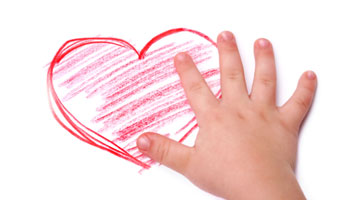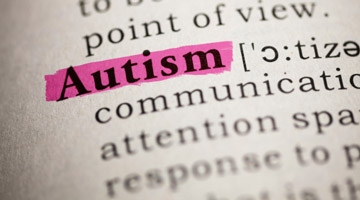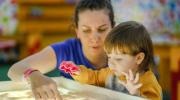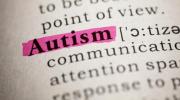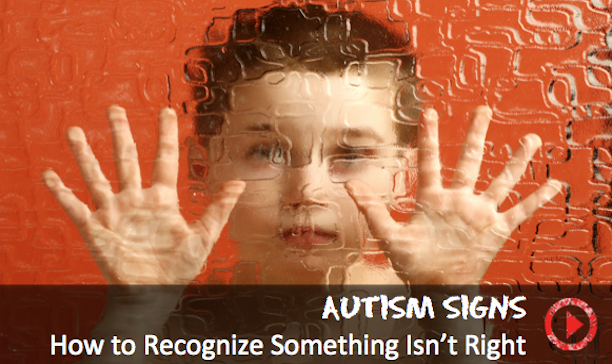Definition and Symptoms
The Warning Signs of Autism
What is Autism? Autism is a neurodevelopmental disorder characterized by cognitive impairments, social impairments, communication difficulties, and repetitive behaviors. Autism is a spectrum disorder which can range from very mild to severe symptoms and occurs in all ethnic, socioeconomic, and age groups. Males are four times more likely to have autism than females. In some children there are no symptoms of autism before age 1 or 2 and then suddenly they “regress” and begin to display symptoms.
Dr. Jerry Kartzinel, a Fellow of the American Academy of Pediatrics, experienced autism firsthand with his son.
“Often I'm asked what my definition of autism is and, of course, there is the standard definition: children who have problems with communicating, repetitive motion, abnormal toy play, social skills, are delayed,” says Dr. Kartzinel, “But really what I look at in a child is how many responses to stimuli the child responds to abnormally.”
Children with autism often display oversensitivity or under-sensitivity to their environments
... Read more
regarding how things sound, taste, smell, touch, or look.
“With my son, he could walk on hot gravel in bare feet in the middle of summertime. Well, he wasn't responding to the hot gravel – the stimuli – in a normal way, he was just walking on it. Some kids would just put their hands on the stove and burn themselves and then they'll do it again. So the more abnormal responses to everyday stimuli, the more challenged we are to help that child to see and perceive our world in a normal way,” says Dr. Kartzinel.
Early Signs
A person with Autism Spectrum Disorder may have the following symptoms:
- Avoid eye contact
- Want to be alone
- Resist or avoid physical contact
- Have difficulty understanding, or showing understanding, of other people’s emotions
- Not respond to their name
- Not point at objects or demonstrate interest
- Not play “pretend” games
- Have no speech or delayed speech
- Repeat words or phrases excessively
- Give unrelated answers to questions
- Get upset by minor changes
- Have obsessive interests
- Flap their hands, rock their body, or spin circles
- Oversensitive or under-sensitive reaction to the way things sound, smell, taste, feel, or look
- Have low to no social skills
- Demonstrate little safety or danger awareness
- Reverse pronouns (ex. Says “you” instead of “I”)
A person with autism may:
- Have unusual interests and behaviors
- Have extreme anxiety and phobias
- Play with toys the same way every time
Other symptoms include:
- Hyperactivity
- Impulsivity
- Short attention span
- Aggression
- Causing self injury
- Meltdowns
- Unusual eating and sleeping habits
- Unusual mood or emotional reactions
- Lack of fear or more fear than expected
- Unusual sleeping habits
The Autism Spectrum
When we talk about Autism Spectrum Disorders, we are referencing three distinct disorders that fall under this umbrella term.
“The first is autistic disorder,” explains Allison Kawa, child psychologist specializing in the evaluation of children and adolescents, “which is when the individual has problems with their communication, with their social skills, and behaviors that are repetitive or idiosyncratic or excessive.”
When most people consider autism, they think of autistic disorder, however, there are two other related disorders that are similar in nature.
“The second diagnosis that would fall under that umbrella is Asperger’s disorder. People with Asperger’s disorder have problems with their social skills. They have problems with their behaviors but they don´t have any delay in their language acquisition the way that someone who has autistic disorder might. People with Asperger’s disorder also have appropriate activities of daily living or adaptive skills,” says Kawa.
Children with Asperger’s may just seem like a neurotypical child behaving a bit differently. To the untrained observer, there may be hardly any noticeable symptoms. They might be only mildly affected and children with Asperger’s frequently have good language and cognitive skills. Unlike children with autism, individuals with Asperger’s typically want to fit in and have social interactions with others, but sometimes don’t know how to successfully do it. They might be socially awkward, show a lack of empathy, or be confused by conventional social rules. One indicator of Asperger’s is an interest in a particular subject that borders on obsessive. This may be a collection of objects, such as rocks or trading cards, or they may be incredibly proficient in categories of information, such as sport statistics.
“The third diagnosis that falls under this umbrella is called pervasive development disorder not otherwise specified or PDDNOS. PDDNOS means that you have symptoms of autism but you don´t quite have enough to meet the full criteria for Asperger’s disorder or Autistic disorder,” says Kawa.
Like autism or Aspergers, PDD-NOS is characterized by delays in development of social and communication skills. PDD-NOS is a relatively new diagnosis, dating back only 15 years or so. Some developmental health professionals refer to PDD-NOS as “subthreshold autism”. It is a diagnosis used for someone who has some but not all of the characteristics of autism or who has relatively mild symptoms.
Early Detection
The key to early detection is to educate yourself so you know what is normal behavior and what is not. Monitor your child’s development by keeping a close eye on when, or if, your child is hitting the key social, emotional, and cognitive milestones. Developmental delays don’t always indicate autism, but they do point to heightened risks. Trust your instincts and see a doctor or specialist if you are concerned about red flags. Listen to your gut if it’s telling you something is wrong. Sometimes concerned parents are told not to worry or to wait and see how the symptoms play out. However, waiting is the worst thing a parent can do. Waiting risks losing valuable time to give your child extra help and targeted treatment. Take action if you are concerned and share your suspicions with your child’s doctor immediately.
Our Top Experts
If you suspect your child has autism, find resources regarding diagnosis and treatment from our top experts at kidsinthehouse.com.




